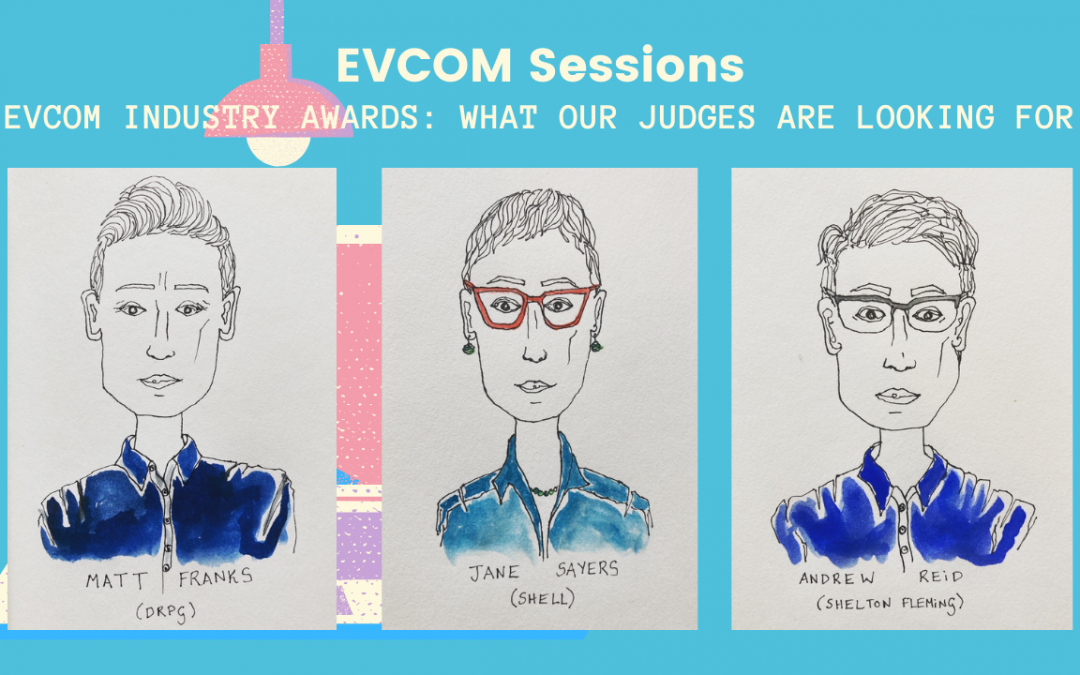The EVCOM London Live and Film Awards, which celebrate excellence and creativity in the corporate film and events sectors, are currently open for entry. So we spoke to three of our esteemed judges, Matt Franks (DRPG), Jane Sayers (Shell) and Andrew Reid (Shelton Fleming) to find out what they are looking for this year, what makes a standout entry and what will be catching their eye!
On the film side, Jane spoke about the importance of creating a film that “leaves a lasting impression”, something that any judge would want to go back to and view time and again. How to do this? For her, it’s all about emotion. Can you create a film that makes the viewer laugh or cry? If the subject matter doesn’t lend itself to that kind of storytelling, then think about trying to come up with a “clever concept” or a piece that highlights “the beauty of the craft” through a strong script and/or cinematography. However you do it, this “extended lifespan” is vital for success, she says. Matt agrees in the importance of creating “connection with the audience”, but he also goes on to highlight the importance of being clear, in your entry, around what the purpose of the film is, and whether it succeeds in delivering it. A beautiful film that doesn’t meet the brief, and fails to communicate its message, won’t be scored as highly as one that does. Andrew adds that he too is looking for “storytelling and production values”, although he says he is always aware of the impact of budget when it comes to production values, and will make compensation for films that have achieved a lot when working with incredibly limited budgets. Like Matt, he underlines the importance of achieving the needs of a brief, and demonstrating this in your entry.
On the live side, where we will be accepting virtual, hybrid and in-person events across all our categories, Matt speaks about what a standout event would look like for him. It’s “got to have a real purpose and clarity,” he says. And you need need to understand your audience so that the event can connect with them on many levels. Ask the question: “what difference did doing this event make?” Whilst these kinds of results can be hard to measure, he recommends trying to capture this by trying to speak to some of your attendees and audience about their experience. Specifically looking at the last year, he says for in-person event entries he will want to know how the event was held safely and how it worked with the new parameters. In a virtual context, he is interested in how technology added value and audience connection to the event. From a hybrid point of view he will be looking at the content for both audiences, with the expectation that the offering is different for both virtual attendees and live attendees. Andrew echoes this, calling for “a focus on engagement.” He wants to know whether and how the audience are interacting with an event, in person and/or virtual, whether interaction is possible in both, and whether there is a possibility for an in-person audience to interact with a virtual audience! Once again, he goes back to the importance of showing a “really good understanding of the brief.” He also highlights the importance of an events theme or identity, how it used and whether it is able to communicate the core of the event quickly. He is interested in understanding the campaign around the event, how it set expectations and got audiences there, which once again comes back to the event’s theme and identity.
As well as entering the film or event itself, we also ask entrants to answer several questions. These questions are given an allocation of the marks, so they are just as important as the film or event itself. Each question needs to be answered in a maximum of 200 words, and Andrew recommends keeping answers “concise and brief”, to bring out the important strands. Where possible on the events side, he recommends attaching filmed content either of the event itself, or of people talking about the event, so that the copy is not the only thing to go on. Whilst outcomes are not always available, Jane says that understanding the objectives and audience for a project are fundamental for a judge. This year, she is particularly interested in finding out “how a film has been achieved” given the restrictions created by Covid-19. On the events side, data is perhaps a bit easier to access, but Matt underlines the importance of using data to answer the question. “Be descriptive and give examples,” he says. And always read it back, putting yourself in the shoes of the judges. Would you recognise it as award-worthy and have you answered the question?
On a personal level, Claire asks each judge what gets them excited about their personal areas of expertise. Matt says he is always impressed by resourcefulness, people who have found incredible and creative solutions to difficult situations and restrictions! Make sure you tell us about the conditions and the context this project was created in so judges can best evaluate this! Andrew agrees, saying he loves to see work that delivers emotion and takes you on a journey despite a modest budget or restrictions in the creative process. “I’m always looking for clever…and if it surprises then all the better,” says Jane. She is looking for a thought, a concept, a way of execution that demonstrates innovation and creativity.
Thank you to our brilliant panelists for sharing their expertise. Find out more about the awards and enter here.
If you missed the session, you can catch up via our recording below:
Accompanying Resources
Read our guide to entering here.
View our showcase of winning work from the 2020 EVCOM London Live and Film Awards here.



